Dr. Choukri Heddouchi, Arabic Department chair, begins part 7 of our tour by sharing his current scholarly involvement in deciphering an Arabic medieval inscription that was recently discovered during a systematic archaeological survey in the Turkish countryside. The image pictured shows the cave above which the inscription is located.
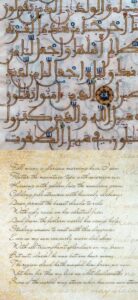
Dr. Choukri shares, “Because of my background in archaeology and Arabic, I have been involved in epigraphic work that involves medieval archaeological Islamic sites in the Middle East. The process of deciphering depends on the context of the inscription. In this recent case, digital pictures were processed in an application to create a 3D representation. This helps facilitate a correct reading. We usually go through comparing the inscription with ones of the same age, so as to familiarize ourselves with distinct terminology used in inscriptions from that era.”
Arabic, in this context, becomes an instrument in the field of archaeology used to shed light on a medieval Islamic past. Similarly, the characterization of Arabic as an instrument used to study the core subjects in Islamic Studies is used by Dr. Choukri to showcase what sets Darul Qasim College’s approach to the study of Arabic apart from other institutions of higher education. Join Dr. Choukri as he takes us from the present and into the future of the Department of Arabic.
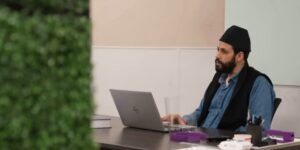
“In the Islamic Sciences, the core content is basically Qurʾān, hadith, fiqh, and ‘aqīdah. But, before you study this, you need some tools, hence instruments. The most important is the Arabic language which includes grammar, conjugation, balāgha (rhetoric), and so forth.”
“Most colleges and universities offer two tracks of study to students interested in studying the Arabic language: classical and modern. Students studying the classics are being trained as historians and the most important thing for historians is to be able to read the texts correctly. This means that reading comprehension is the most important. After 9/11, there was a shift and interest in modern Arabic. Now, modern Arabic is still Arabic, but the focus was mostly on speaking and listening comprehension. Western academia spent less time on grammar, so that they could train people in how to communicate.”
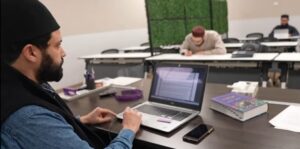
“Usually, a student goes either classics or modern. You do not do both because it takes a lot of time. That’s a speciality. In Arabic, you are covering at least 14 centuries of literature and that’s huge if you compare it to Shakespearean English or a little before which goes back 3 or 4 centuries. We are talking about five times that period. Alḥamdulillah, what is beautiful about Arabic is that the same grammar still works, meaning if you are going to do modern Arabic or classical Arabic, you still have to study the same grammar.”
“What is unique about Darul Qasim is that we need both classical and modern Arabic. We recognize it’s a lot of work, but we need both. We need people who are perfectly comfortable in reading and comprehending text, meaning basically the Qurʾān and Sunnah, mā shā’ Allah.”
“The most important thing is for our students to read the text. For example, to be able to read the Qurʾān and to understand it. That is reading comprehension. Training will be heavy on grammar and conjugation and on rhetoric (balāgha). For the beginner that’s what we train them to do and we spend a lot of time drilling them on that. As students advance, we want them to be able to communicate what they know in Arabic, so we focus on listening comprehension and on speaking. Especially if they are going to engage other Muslim scholars from overseas whose common language is not English, but rather Arabic. For this very reason, this year we created the Friday labs. The Friday labs are just once a week at the moment. In these labs, students speak and write in Arabic depending on their level.”
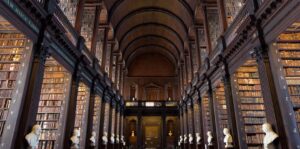
“Darul Qasim College’s Arabic Department is looking towards the future. In shā’ Allah, we will produce our own PhDs and so forth. These people will be like guardians. Because a lot of what is happening in academia, not all of it, but a lot of it, is just sometimes almost ridiculous.”
“From my experience, I know that a lot of people who are in academia, their knowledge of Arabic is nowhere near our senior students. It just doesn’t compare. What is sad is that people are writing theses and dissertations and making outrageous claims. If somebody knows what they are doing, responding to them is easy. They will know they cannot get away with outrageous claims without backing it up.”
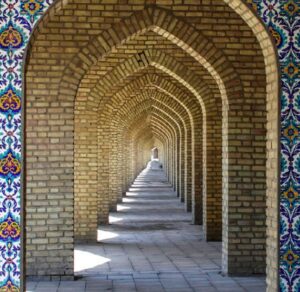
“We hope to engage academia in language theory, meaning engaging people in linguistics, who don’t necessarily specialize in Arabic. There is a massive Islamic Heritage study and because it is the Qurʾān the amount of effort and time that was put into it is incredible. A lot of people, especially those who don’t study Arabic, are not aware of it. It is our job to present it. We have dealt with these issues like semantics, phonetics, and linguistics.”
“If you want to be on the cutting edge of what was produced internationally, you have to know Islamic heritage. So, we will be doing defending, we will be doing presenting, and if we excel in it, we will be challenging. That is how we are thinking of leading the department in shā’ Allah.”
Chair, Department of Arabic and Instrumental Sciences
choukri.heddouchi@darulqasim.org